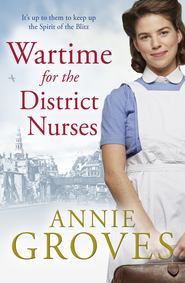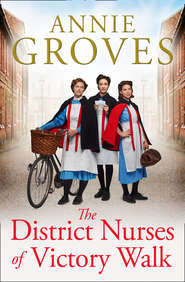По всем вопросам обращайтесь на: info@litportal.ru
(©) 2003-2024.
✖
My Sweet Valentine
Настройки чтения
Размер шрифта
Высота строк
Поля
‘You’re better watch that ankle of yours in those shoes on all this rubble,’ Sally warned, glancing down at the ankle Dulcie had broken at the beginning of the Blitz in September. ‘If I were you I’d wear a pair of shoes with lower heels than those, Dulcie.’
‘Well, you aren’t me, are you?’ Dulcie retorted in typical fashion. ‘You’d never catch me wearing them ugly black things you’ve got to wear,’ she added disparagingly, looking down at Sally’s sturdy shoes.
‘Try telling me that when you’ve been walking miles up and down hospital corridors and wards,’ Sally responded. She worked as a theatre sister at St Bartholomew’s Hospital.
‘And besides,’ Dulcie continued, ‘for all I knew Wilder could have turned up with Drew and the last thing I want is for him to see me not looking my best. I just hope this doesn’t mean that we won’t be able to go to the Hammersmith Palais’s New Year’s Eve dance,’ she added, as she and Sally met up with Tilly and Drew. Not even her scowl or her sharp tone of voice could hide the fact that Dulcie was a stunningly beautiful young woman, with her blond curls and her perfect English rose complexion. She had the figure to go with her face as well, and Tilly wasn’t surprised that the young American pilot Drew had introduced to Dulcie should be so keen on her.
‘I’m sure that nothing will prevent Wilder from getting up to London to take you to the dance, Dulcie,’ Drew assured her.
‘It’s all very well you saying that, but there’s been talk of leave being cancelled, and there not being any trains running.’
‘If that’s the case then he will just have to fly here in a fighter plane,’ Drew teased Dulcie, who pulled a face at him.
Wilder, the young American she was dating, was a member of the American Eagles, the fighter pilot unit that was attached to the RAF. These brave young American pilots, ignoring the fact that their country had not joined the war and was insisting on remaining neutral, had nevertheless come over to Britain and offered their services to the RAF. Their ‘uniform’, such as it was, consisted of well-worn ‘pants’ to fly by the seat of, a swagger, fiercely chewed gum, and well-worn heavy-duty flying jackets. Needless to say they attracted girls like honey attracted bees.
‘I know one thing that does mean,’ Dulcie grumbled, ‘and that’s that they’ll be making even more fuss at Selfridges about having us up on the roof doing fire-watching duties because of this lot, especially Miss Cotton, since she’s the one always going on about it.’
Every business in the city was supposed to provide fire-watchers from their staff to make sure that any falling incendiaries were extinguished before the flames could take hold. So far Dulcie, who worked in the cosmetics department of the luxury store on Oxford Street, had managed to wriggle out of doing any fire-watching herself by claiming that her broken ankle was still too weak for her to risk clambering about on the roof. Though it was not, of course, too weak for her to go dancing on it. Of course not!
‘We ought to be getting back now that the light’s starting to go,’ Olive told Audrey Windle with an anxious look towards the girls. ‘I’d hate for us to be caught out in the open if Hitler decides to come back again tonight.’
‘You’re right,’ her friend agreed. ‘We’ve got WVS tonight and I thought we’d go through those bags of second-hand clothes Sergeant Dawson brought in to the church hall on Saturday. I feel guilty about taking them. They must belong to someone … even if …’
Even if their owner was no longer alive to wear them, Olive knew that Audrey meant. They had an arrangement with a local laundry that had offered to launder the clothes they brought in for a very modest amount paid for out of the funds they raised, as and when they could, which at least meant they handed out clean and fresh clothes to those in need.
It was growing darker by the minute, only thankfully small fires now illuminating the nightmare scene of destruction surrounding them as Olive gathered together her small brood.
‘It’s all right if Drew comes back with us for supper, isn’t it, Mum?’ Tilly asked, tucking her arm through Olive’s.
‘Yes, of course,’ Olive agreed, earning her arm a small squeeze before Tilly dropped back, no doubt finding a much more romantic place to tuck her arm with Drew, Olive guessed. She might be thirty-seven but that didn’t mean that she couldn’t remember what it was like to be young and in love, which was why she was so concerned for her daughter. She knew the intoxication that came with true love. Sometimes even now she’d wake up in the early hours, vulnerable with sleep, aching inside for the warmth of loving male arms to turn to, and a loving husband to love her back.
They all had their torches but it made sense for them to use only one of them, to save their batteries. Olive and Audrey led the way, coming to an abrupt halt when they nearly walked into a wooden barrier blocking off a side road, a notice pinned to it warning, ‘No Access – Unexploded Bomb’. Olive played her torch carefully to either side. On one building, its windows bombed out, the holes gaping blackly like rotting teeth in a dusty red-brick mouth, they all saw someone had chalked, ‘London can take it.’ Fiercely Olive blinked away her emotion.
Down the next street they passed a group of men still searching quietly in the filthy soot and dust-coated rubble of what had once been a row of buildings but that was now a line of jagged roofless outlines against the darkening sky.
Olive started to walk more quickly, hissing to the girls to ‘keep up’, not wanting to raise her voice in case the sound disturbed the men listening so carefully at those still mounds of rubble, just in case there might be someone inside them still alive.
‘Ugh. Look, I’ve got soot and grease on my gloves,’ Dulcie complained once they were all standing together in the safety and warmth of number 13’s hallway. Holding up her hands, she displayed for everyone else’s inspection the pretty gloves that had been a Christmas present from Olive, who had knitted a pair for each of the girls from wool she had unravelled from old jumpers and the like, handed over to the WVS for reuse. The money she’d paid for the items and the work she had to do, not just in the knitting but also in unpicking and then washing the wool in the first place, was rewarded every time she saw her girls go out with their hands warmly wrapped in their gloves.
‘Give them to me. It will wash out with a bit of Dreft,’ she assured Dulcie, in the general bustle of coats, scarves and hats being removed and hung on the hall coat stand, prior to everyone hurrying into the warmth of the cosy family kitchen at the back of the house.
Olive’s kitchen, with its duck-egg-blue and cream colour scheme, gave her a thrill of pride every time she walked into it. Her late father-in-law had bought the kitchen units for her, having had them copied by someone he knew after Olive had seen and fallen in love with them at a furniture exhibition the year before he had died.
Number 13 had been Olive’s in-laws’ home and she had inherited it from them. It had been her and Tilly’s home all Tilly’s life, and Olive loved it dearly.
Tonight, with thoughts of the destruction they had all just seen, she was more conscious than ever of how precious her home was to her. They had been lucky so far that no bombs had fallen near Article Row. The previous night’s air raid was the closest the falling bombs had come so far. Now, looking round, Olive felt a pang of something approaching guilt because her home was standing when so many weren’t; that those she loved and cared about were safe when so many weren’t, she acknowledged.
It was Sally, with her practical nurse’s manner, who was putting the kettle on and lighting the gas, whilst Tilly got out the mugs, handing them to Drew, the two of them exchanging tender smiles as their fingers touched.
‘Come on, you two lovebirds,’ Dulcie, whose sharp eyes never missed a thing, teased them. ‘I’m gasping for a brew after being out in all that dust and smoke. I dare say there’s all sorts in them cinders we were breathing in,’ she added darkly.
‘What do you mean?’ Agnes squeaked. When Dulcie gave her a meaningful look she demanded, turning slightly green, ‘You mean bodies and things?’
‘Well, what do you think happens when people get burned to death? There’s bound to be summat left,’ Dulcie insisted.
‘That’s enough of that kind of talk, thank you, Dulcie,’ Olive warned her lodger, then sent Agnes to get the milk from the larder.
Hurrying back into the warmth, Agnes reflected on how lucky she was. Abandoned as a baby outside a local orphanage, she’d been terrified at seventeen when the matron had told her that she’d found her a job on the underground and a room to rent. She’d dreaded having to leave the only home she’d ever known. But now number 13 was her home, and the other girls her best friends, especially Tilly, whose bedroom she shared. And it wasn’t just the other girls who’d changed her life. She’d met Ted, a young underground train driver, at work, and she loved him with all her heart, even if the two of them couldn’t even think of getting married for years. Ted had a widowed mother and two young sisters to support, so they wouldn’t be able to marry until Ted’s sisters were grown up and settled. Ted was, after all, the sole breadwinner in their small household. Agnes understood and respected that. In fact, she admired her Ted more than ever for wanting to do his duty by his family.
But …
But Ted’s mother did not want her to marry Ted. Agnes was sure of it, even though Ted told her that she was being silly.
Agnes gave a small sad sigh. She had longed all her life to be part of a proper family, but Olive, her landlady, showed her far more warmth and kindness than Ted’s mother. The reason for that was that Agnes had been left on the orphanage doorstep with nothing to indicate anything about her parentage, or who or what her family had been. Ted had explained to her that his mother’s own mother had grown up in poverty with the threat of the poorhouse always hanging over her. Because of that, respectability – the kind of respectability that came not just from being able to pay one’s way in life but, just as important, from knowing who one’s antecedents were – was very important to Ted’s mother. She had strong views about bad blood being passed on to her grandchildren. These were views that Ted did not share. Agnes knew that Ted loved her and sometimes she thought that she was being very greedy indeed to want Ted’s mother to love her as well, but Mrs Jackson’s animosity was a hurt she could not put aside.
The tea brewed, they all settled down around the table, the lack of chairs for everyone allowing Tilly to perch on Drew’s knee, determinedly ignoring the look Olive was giving her as she did so.
‘Do you think it’s true what that fireman told us, about the Germans deliberately planning things so that the firebombs would land at the lowest point of the tide, so that the fire engines couldn’t get a proper water supply?’ Tilly asked Drew.
‘I guess so. Wouldn’t you say so, Ted?’
‘It certainly looks like it,’ Ted agreed. ‘And it worked as well.’
‘It definitely has,’ Sally joined in grimly. She’d been on duty when they’d started bringing in the first of the casualties. Two firemen had died in one of the ambulances before they’d even got them to Barts. She’d thought briefly of George, her young man, whilst they’d worked as swiftly as they could in the hospital’s operating theatre, moved down in the basement for the duration – not because she knew he’d be concerned about her but because they knew all about treating badly burned patients at East Grinstead. They dealt with the young airmen who had survived their burning planes, as well as other disfigured patients.
It wasn’t just burns the patients being brought into Barts had suffered, though. Some had lost limbs, some had been badly crushed, and there’d been dreadful tales of the fate met by some of the dead: flesh and fabric melted together, and blown off bodies by the force of the bombs, terrible, terrible things that you just did not want to think about but that you couldn’t help but think about later, trying to sleep.
Sally had come to London originally because she had needed desperately to escape from her home in Liverpool. As a young nurse in training in Liverpool she had befriended another young nurse, Morag. Following the deaths of their parents in a boating accident Morag and her older brother, Callum, had moved to Liverpool when Callum had secured a job as a teacher in the city. Right from the very start Sally had been attracted to tall, dark-haired and good-looking Callum. However, it had been Callum’s good nature, his concern for his sister, his care for his pupils and his gratitude to her own parents for the friendship they had extended towards the siblings that had turned Sally’s semi-infatuation into something much stronger.
When Callum had hinted that he had equally strong feelings for her and that they had a future together, Sally felt she was the happiest girl in the whole world. But then her mother had become fatally ill with cancer. Sally had been devastated. Morag had insisted on helping Sally to nurse her mother, sharing the duty of care with her, just, so Sally had naïvely thought, as though she too were a daughter of the family. Sally had also believed that Morag’s care for her father had simply been the care of a loving daughter. But then her eyes had been brutally opened when, after her mother’s death, she had found Morag and her father in an embrace that had shown her quite clearly the true nature of their relationship.
Worse was to follow. Sally’s father and Morag were to marry, and Callum, far from condemning his sister, had taken Morag’s side, accusing Sally of being unfair to both her father and his sister.
Sally had left Liverpool in the grip of almost unbearable anger and misery. Work, the kindness of Olive, her landlady, the friendship of Tilly and her fellow lodgers, and most of all the love she now shared with another and far more worthy young man, had done a great deal to make her feel once more that life was worth living. But there was still a hard kernel of anger and pain inside her because of what Morag had done. The death of her mother, followed within months by her father’s remarriage to the girl Sally had thought of as her best friend had been something she could never accept.
Sally looked at the mince pie she had just put on her plate and pushed it away. Now her father and Morag had a baby, Callum had told her, when he had found out where she was and come here, to number 13, in an attempt to persuade her to ‘make up’ with his sister. Sally, of course, had refused. How little he had known her, and of her love for her mother, to dare to ask that of her. How unworthy he had been of her mother’s kindness, and the love she herself had once believed she felt for him. Not that any of them cared about what she felt. Not one little bit. They had proved that …
Sally’s throat closed up. She could well imagine the happy Christmas they would all have had. Her father, putting up for his new daughter the same Christmas lights he had once put up for her. No doubt Callum would be there too, if he was on leave from the navy. Traitors all of them – yes, even her father – to her and, even worse, to the kindness and love her mother had shown them. They didn’t deserve a single second of her thoughts. She had a new life now. A happy life, with a job she loved, working as a theatre nurse at Barts Hospital, and a new love in George Laidlaw, the young New Zealander from Christchurch who had come to London to train as a doctor and who was now working in Sussex.
She shouldn’t – mustn’t – think about the past any more. She had locked the door on it and left it behind. George knew nothing about her past. It hadn’t been necessary for her to tell him when they had first met, and by the time she had realised that George had assumed that both her parents were dead, Sally had felt that there was no point in resurrecting the past and all the pain that it contained. She hadn’t fallen in love with George overnight. Their love had grown at a quieter deeper pace. Dear George. He loved her so much. She was safe with him. He would always put her first. And she loved him too. The past was best left where it was – in Liverpool.
Thinking of George reminded Sally that she had promised to go down to the hospital in the new year once she had some decent leave that would allow the two of them to have a few days together. Her appetite returning, Sally picked up the mince pie she had pushed away earlier and tucked in to it, unaware that Olive had noted her distress and was relieved now to see that it had passed.
Life brought enough problems and upset for young hearts, especially young female hearts, to worry about, without their having to carry the added burden of the war and Hitler’s bombs, she thought protectively.
Still seated on Drew’s knee, even though she could tell from the looks her mother was sending her that Olive wasn’t entirely happy about their public intimacy, Tilly gave him a tender, loving look. She was in no mood to comply with her mother’s unspoken wishes. Her close brush with death hadn’t just left her feeling more shaken and vulnerable than she wanted to admit, she had been brought face to face with the possibility of her own death. In those few seconds she had grown from a girl to a woman. And now as that woman she was filled with a fierce hunger to live every single moment of her life to its fullest capacity with the man she loved. Drew had saved her. Drew had kept her safe and made her feel safe. Tonight, instead of saying good night to him she wanted to be with him. Tonight she wanted to lie in his arms and be close to him, to share with him everything that there was to share.
The girl she had been such a very short time ago would instinctively have retreated from that kind of intimacy, shying away from it, and a little afraid of it. The woman her near miss with death had created had no such fears. Instead she wanted to embrace that intimacy, whilst they both still could.











